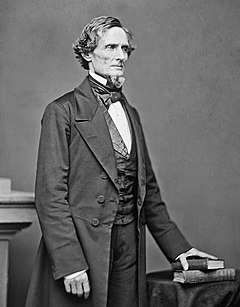Jefferson Davis
Presidente dos Estados Confederados da América de 1861 a 1865
Jefferson Finis Davis (Fairview, 3 de junho de 1808 – Nova Orleans, 6 de dezembro de 1889) foi um estadista norte-americano e Presidente dos Estados Confederados da América durante a Guerra Civil Americana.
| Jefferson Davis |
|---|
 |
Sobre
editar- "Eu não acredito que nossos amigos no Sul tenham qualquer idéia justa do estado de sentimento, apressando-se neste momento a um arremesso de exasperação intensa, entre esses que respeitam suas obrigações políticas, e esses que aparentemente não têm nenhum poder mas que os impele a uma posição fanática sobre a questão de transmissão da Escravidão doméstica. Sem discutir a questão de direito — de poder separar-se abstratamente — eu nunca acreditei que essa perturbação real da União pode ocorrer sem sangue; e se, pela loucura de Abolucionistas do norte, essa calamidade terrível deve vir, a luta não será ao longo de Mason e Dixon meramente. Ela [irá] é dentro das nossas próprias fronteiras, em nossas próprias ruas, entre as duas classes de cidadãos a quem eu referi.
- - I do not believe that our friends at the South have any just idea of the state of feeling, hurrying at this moment to a pitch of intense exasperation, between those who respect their political obligations, and those who apparently have no impelling power but that which a fanatical position on the subject of domestic Slavery imparts. Without discussing the question of right — of abstract power to secede — I have never believed that actual disruption of the Union can occur without blood; and if, through the madness of Northern Abolitionists, that dire calamity must come, the fighting will not be along Mason's and Dixon's line merely. It [will] be within our own borders, in our own streets, between the two classes of citizens to whom I have referred.
- - Carta de Franklin Pierce a Jefferson Davis (6 de janeiro de 1860)
- - I do not believe that our friends at the South have any just idea of the state of feeling, hurrying at this moment to a pitch of intense exasperation, between those who respect their political obligations, and those who apparently have no impelling power but that which a fanatical position on the subject of domestic Slavery imparts. Without discussing the question of right — of abstract power to secede — I have never believed that actual disruption of the Union can occur without blood; and if, through the madness of Northern Abolitionists, that dire calamity must come, the fighting will not be along Mason's and Dixon's line merely. It [will] be within our own borders, in our own streets, between the two classes of citizens to whom I have referred.